The State, EU, and Decommodification: A Political Science Perspective
VerifiedAdded on 2023/06/15
|7
|1859
|170
Essay
AI Summary
This essay delves into the concept of the state within political science, examining its historical formation, particularly in Europe, and its evolving relevance in the context of the European Union. It discusses the state's role in maintaining order, its relationship with society, and the power dynamics it embodies. The essay further explores the concept of decommodification, analyzing its impact on the relationship between capitalism and democracy, and its role in the development of European welfare states. It argues that decommodification is essential for a democratic society, freeing individuals from market exploitation and promoting human development. The analysis covers the historical power struggles between the state, church, and other institutions, culminating in the rise of constitutional frameworks. The essay concludes by emphasizing the importance of understanding the state-society relationship and the influence of the EU on state sovereignty.
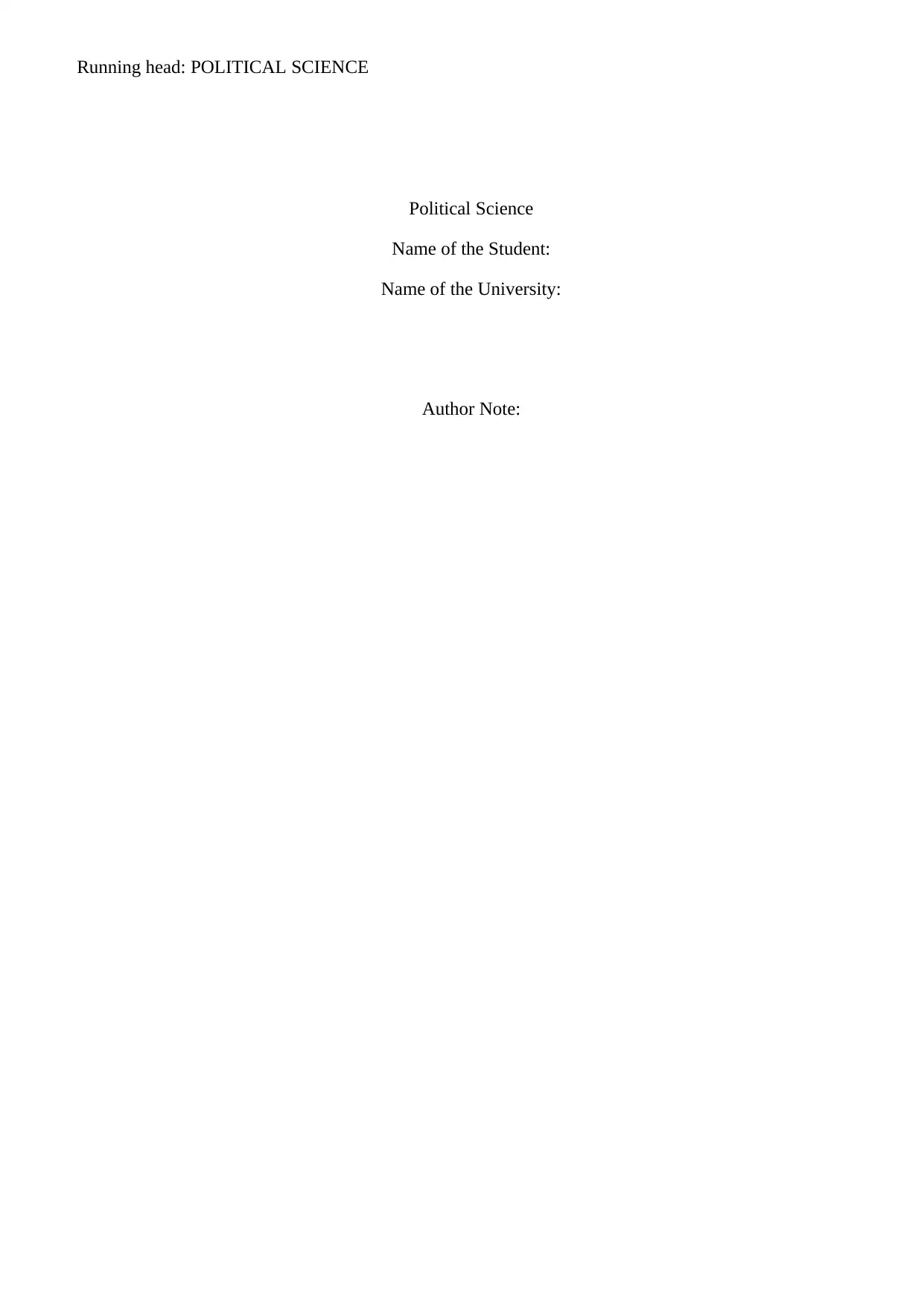
Running head: POLITICAL SCIENCE
Political Science
Name of the Student:
Name of the University:
Author Note:
Political Science
Name of the Student:
Name of the University:
Author Note:
Paraphrase This Document
Need a fresh take? Get an instant paraphrase of this document with our AI Paraphraser
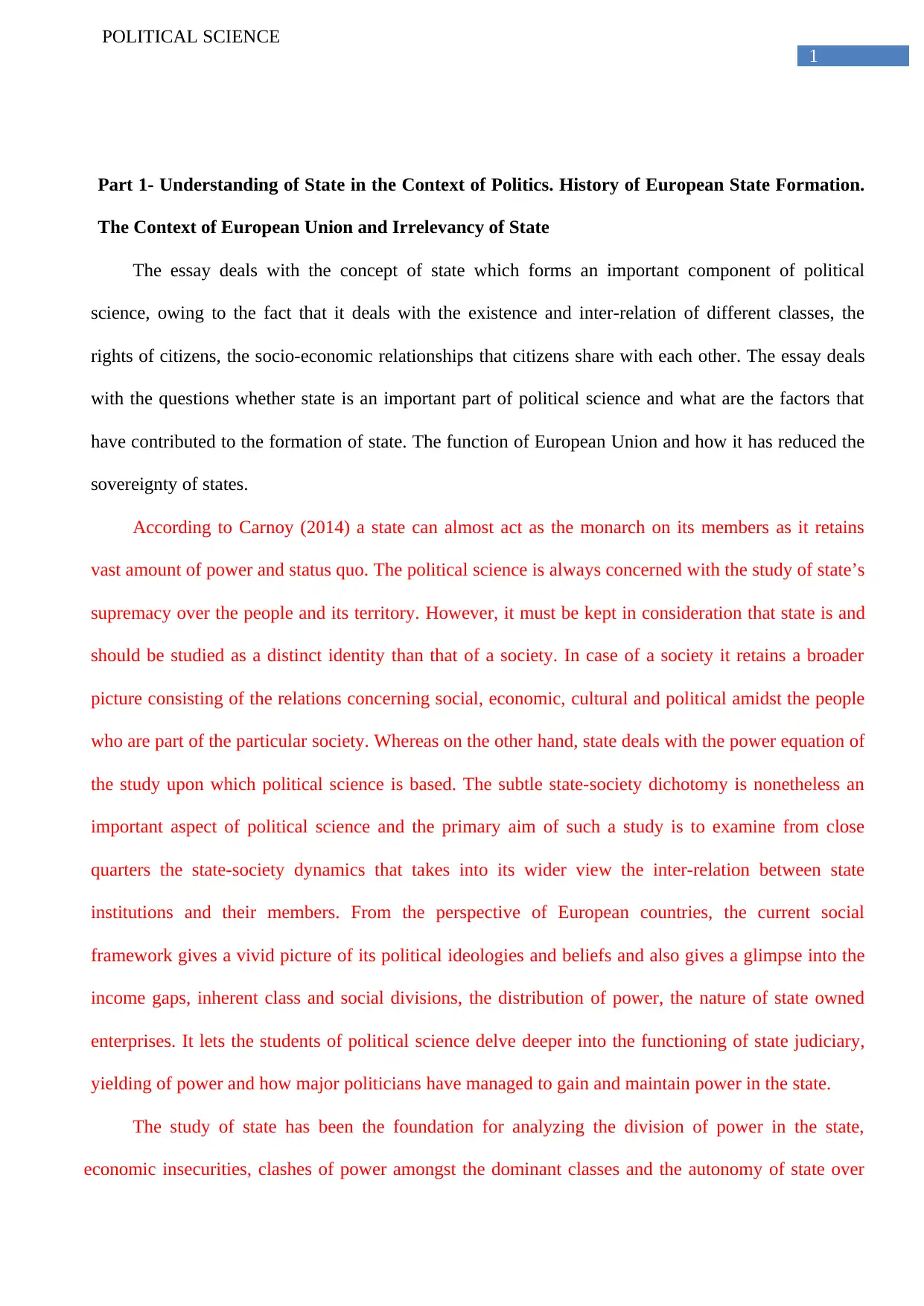
1
POLITICAL SCIENCE
Part 1- Understanding of State in the Context of Politics. History of European State Formation.
The Context of European Union and Irrelevancy of State
The essay deals with the concept of state which forms an important component of political
science, owing to the fact that it deals with the existence and inter-relation of different classes, the
rights of citizens, the socio-economic relationships that citizens share with each other. The essay deals
with the questions whether state is an important part of political science and what are the factors that
have contributed to the formation of state. The function of European Union and how it has reduced the
sovereignty of states.
According to Carnoy (2014) a state can almost act as the monarch on its members as it retains
vast amount of power and status quo. The political science is always concerned with the study of state’s
supremacy over the people and its territory. However, it must be kept in consideration that state is and
should be studied as a distinct identity than that of a society. In case of a society it retains a broader
picture consisting of the relations concerning social, economic, cultural and political amidst the people
who are part of the particular society. Whereas on the other hand, state deals with the power equation of
the study upon which political science is based. The subtle state-society dichotomy is nonetheless an
important aspect of political science and the primary aim of such a study is to examine from close
quarters the state-society dynamics that takes into its wider view the inter-relation between state
institutions and their members. From the perspective of European countries, the current social
framework gives a vivid picture of its political ideologies and beliefs and also gives a glimpse into the
income gaps, inherent class and social divisions, the distribution of power, the nature of state owned
enterprises. It lets the students of political science delve deeper into the functioning of state judiciary,
yielding of power and how major politicians have managed to gain and maintain power in the state.
The study of state has been the foundation for analyzing the division of power in the state,
economic insecurities, clashes of power amongst the dominant classes and the autonomy of state over
POLITICAL SCIENCE
Part 1- Understanding of State in the Context of Politics. History of European State Formation.
The Context of European Union and Irrelevancy of State
The essay deals with the concept of state which forms an important component of political
science, owing to the fact that it deals with the existence and inter-relation of different classes, the
rights of citizens, the socio-economic relationships that citizens share with each other. The essay deals
with the questions whether state is an important part of political science and what are the factors that
have contributed to the formation of state. The function of European Union and how it has reduced the
sovereignty of states.
According to Carnoy (2014) a state can almost act as the monarch on its members as it retains
vast amount of power and status quo. The political science is always concerned with the study of state’s
supremacy over the people and its territory. However, it must be kept in consideration that state is and
should be studied as a distinct identity than that of a society. In case of a society it retains a broader
picture consisting of the relations concerning social, economic, cultural and political amidst the people
who are part of the particular society. Whereas on the other hand, state deals with the power equation of
the study upon which political science is based. The subtle state-society dichotomy is nonetheless an
important aspect of political science and the primary aim of such a study is to examine from close
quarters the state-society dynamics that takes into its wider view the inter-relation between state
institutions and their members. From the perspective of European countries, the current social
framework gives a vivid picture of its political ideologies and beliefs and also gives a glimpse into the
income gaps, inherent class and social divisions, the distribution of power, the nature of state owned
enterprises. It lets the students of political science delve deeper into the functioning of state judiciary,
yielding of power and how major politicians have managed to gain and maintain power in the state.
The study of state has been the foundation for analyzing the division of power in the state,
economic insecurities, clashes of power amongst the dominant classes and the autonomy of state over
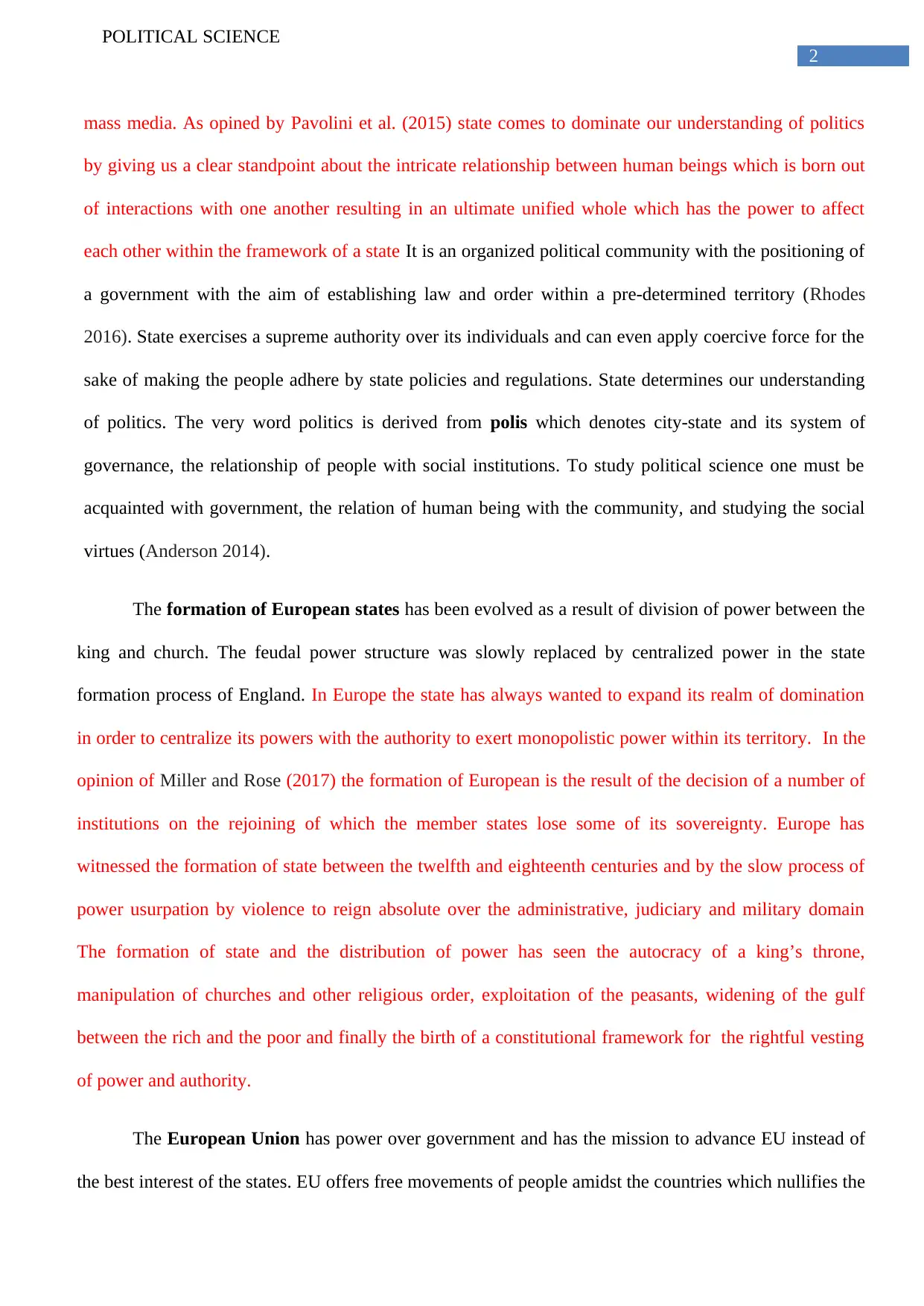
2
POLITICAL SCIENCE
mass media. As opined by Pavolini et al. (2015) state comes to dominate our understanding of politics
by giving us a clear standpoint about the intricate relationship between human beings which is born out
of interactions with one another resulting in an ultimate unified whole which has the power to affect
each other within the framework of a state It is an organized political community with the positioning of
a government with the aim of establishing law and order within a pre-determined territory (Rhodes
2016). State exercises a supreme authority over its individuals and can even apply coercive force for the
sake of making the people adhere by state policies and regulations. State determines our understanding
of politics. The very word politics is derived from polis which denotes city-state and its system of
governance, the relationship of people with social institutions. To study political science one must be
acquainted with government, the relation of human being with the community, and studying the social
virtues (Anderson 2014).
The formation of European states has been evolved as a result of division of power between the
king and church. The feudal power structure was slowly replaced by centralized power in the state
formation process of England. In Europe the state has always wanted to expand its realm of domination
in order to centralize its powers with the authority to exert monopolistic power within its territory. In the
opinion of Miller and Rose (2017) the formation of European is the result of the decision of a number of
institutions on the rejoining of which the member states lose some of its sovereignty. Europe has
witnessed the formation of state between the twelfth and eighteenth centuries and by the slow process of
power usurpation by violence to reign absolute over the administrative, judiciary and military domain
The formation of state and the distribution of power has seen the autocracy of a king’s throne,
manipulation of churches and other religious order, exploitation of the peasants, widening of the gulf
between the rich and the poor and finally the birth of a constitutional framework for the rightful vesting
of power and authority.
The European Union has power over government and has the mission to advance EU instead of
the best interest of the states. EU offers free movements of people amidst the countries which nullifies the
POLITICAL SCIENCE
mass media. As opined by Pavolini et al. (2015) state comes to dominate our understanding of politics
by giving us a clear standpoint about the intricate relationship between human beings which is born out
of interactions with one another resulting in an ultimate unified whole which has the power to affect
each other within the framework of a state It is an organized political community with the positioning of
a government with the aim of establishing law and order within a pre-determined territory (Rhodes
2016). State exercises a supreme authority over its individuals and can even apply coercive force for the
sake of making the people adhere by state policies and regulations. State determines our understanding
of politics. The very word politics is derived from polis which denotes city-state and its system of
governance, the relationship of people with social institutions. To study political science one must be
acquainted with government, the relation of human being with the community, and studying the social
virtues (Anderson 2014).
The formation of European states has been evolved as a result of division of power between the
king and church. The feudal power structure was slowly replaced by centralized power in the state
formation process of England. In Europe the state has always wanted to expand its realm of domination
in order to centralize its powers with the authority to exert monopolistic power within its territory. In the
opinion of Miller and Rose (2017) the formation of European is the result of the decision of a number of
institutions on the rejoining of which the member states lose some of its sovereignty. Europe has
witnessed the formation of state between the twelfth and eighteenth centuries and by the slow process of
power usurpation by violence to reign absolute over the administrative, judiciary and military domain
The formation of state and the distribution of power has seen the autocracy of a king’s throne,
manipulation of churches and other religious order, exploitation of the peasants, widening of the gulf
between the rich and the poor and finally the birth of a constitutional framework for the rightful vesting
of power and authority.
The European Union has power over government and has the mission to advance EU instead of
the best interest of the states. EU offers free movements of people amidst the countries which nullifies the
⊘ This is a preview!⊘
Do you want full access?
Subscribe today to unlock all pages.

Trusted by 1+ million students worldwide
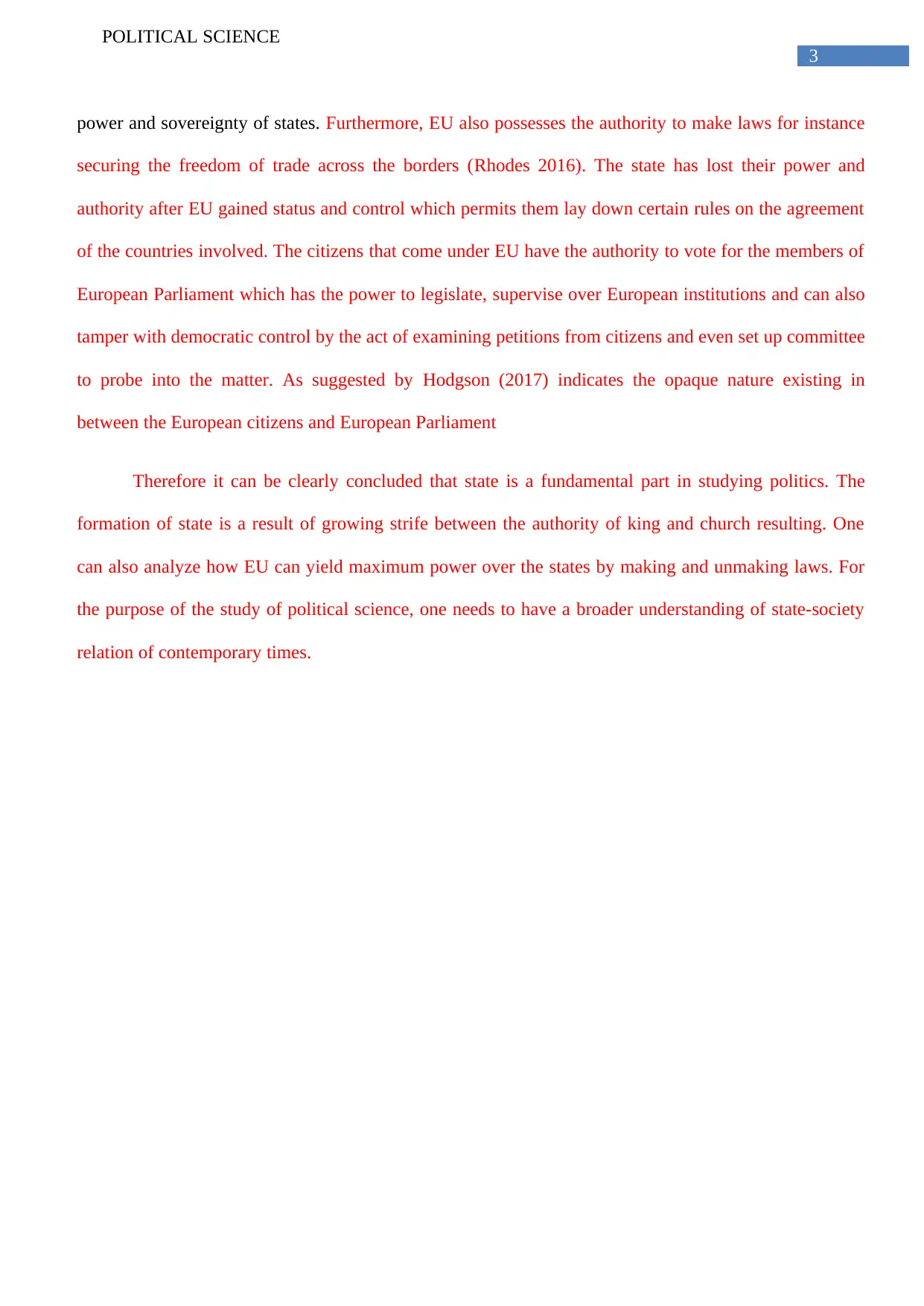
3
POLITICAL SCIENCE
power and sovereignty of states. Furthermore, EU also possesses the authority to make laws for instance
securing the freedom of trade across the borders (Rhodes 2016). The state has lost their power and
authority after EU gained status and control which permits them lay down certain rules on the agreement
of the countries involved. The citizens that come under EU have the authority to vote for the members of
European Parliament which has the power to legislate, supervise over European institutions and can also
tamper with democratic control by the act of examining petitions from citizens and even set up committee
to probe into the matter. As suggested by Hodgson (2017) indicates the opaque nature existing in
between the European citizens and European Parliament
Therefore it can be clearly concluded that state is a fundamental part in studying politics. The
formation of state is a result of growing strife between the authority of king and church resulting. One
can also analyze how EU can yield maximum power over the states by making and unmaking laws. For
the purpose of the study of political science, one needs to have a broader understanding of state-society
relation of contemporary times.
POLITICAL SCIENCE
power and sovereignty of states. Furthermore, EU also possesses the authority to make laws for instance
securing the freedom of trade across the borders (Rhodes 2016). The state has lost their power and
authority after EU gained status and control which permits them lay down certain rules on the agreement
of the countries involved. The citizens that come under EU have the authority to vote for the members of
European Parliament which has the power to legislate, supervise over European institutions and can also
tamper with democratic control by the act of examining petitions from citizens and even set up committee
to probe into the matter. As suggested by Hodgson (2017) indicates the opaque nature existing in
between the European citizens and European Parliament
Therefore it can be clearly concluded that state is a fundamental part in studying politics. The
formation of state is a result of growing strife between the authority of king and church resulting. One
can also analyze how EU can yield maximum power over the states by making and unmaking laws. For
the purpose of the study of political science, one needs to have a broader understanding of state-society
relation of contemporary times.
Paraphrase This Document
Need a fresh take? Get an instant paraphrase of this document with our AI Paraphraser
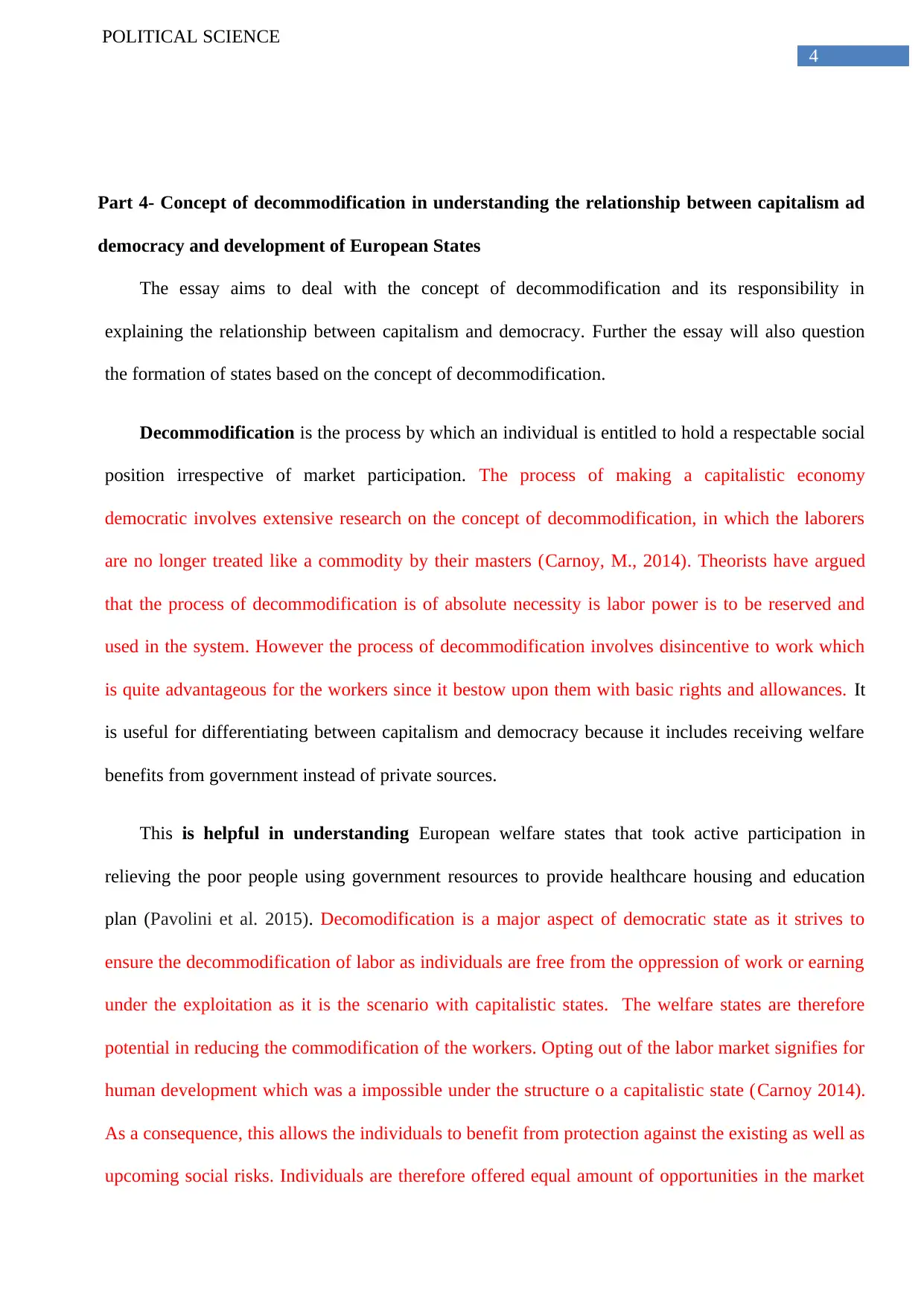
4
POLITICAL SCIENCE
Part 4- Concept of decommodification in understanding the relationship between capitalism ad
democracy and development of European States
The essay aims to deal with the concept of decommodification and its responsibility in
explaining the relationship between capitalism and democracy. Further the essay will also question
the formation of states based on the concept of decommodification.
Decommodification is the process by which an individual is entitled to hold a respectable social
position irrespective of market participation. The process of making a capitalistic economy
democratic involves extensive research on the concept of decommodification, in which the laborers
are no longer treated like a commodity by their masters (Carnoy, M., 2014). Theorists have argued
that the process of decommodification is of absolute necessity is labor power is to be reserved and
used in the system. However the process of decommodification involves disincentive to work which
is quite advantageous for the workers since it bestow upon them with basic rights and allowances. It
is useful for differentiating between capitalism and democracy because it includes receiving welfare
benefits from government instead of private sources.
This is helpful in understanding European welfare states that took active participation in
relieving the poor people using government resources to provide healthcare housing and education
plan (Pavolini et al. 2015). Decomodification is a major aspect of democratic state as it strives to
ensure the decommodification of labor as individuals are free from the oppression of work or earning
under the exploitation as it is the scenario with capitalistic states. The welfare states are therefore
potential in reducing the commodification of the workers. Opting out of the labor market signifies for
human development which was a impossible under the structure o a capitalistic state (Carnoy 2014).
As a consequence, this allows the individuals to benefit from protection against the existing as well as
upcoming social risks. Individuals are therefore offered equal amount of opportunities in the market
POLITICAL SCIENCE
Part 4- Concept of decommodification in understanding the relationship between capitalism ad
democracy and development of European States
The essay aims to deal with the concept of decommodification and its responsibility in
explaining the relationship between capitalism and democracy. Further the essay will also question
the formation of states based on the concept of decommodification.
Decommodification is the process by which an individual is entitled to hold a respectable social
position irrespective of market participation. The process of making a capitalistic economy
democratic involves extensive research on the concept of decommodification, in which the laborers
are no longer treated like a commodity by their masters (Carnoy, M., 2014). Theorists have argued
that the process of decommodification is of absolute necessity is labor power is to be reserved and
used in the system. However the process of decommodification involves disincentive to work which
is quite advantageous for the workers since it bestow upon them with basic rights and allowances. It
is useful for differentiating between capitalism and democracy because it includes receiving welfare
benefits from government instead of private sources.
This is helpful in understanding European welfare states that took active participation in
relieving the poor people using government resources to provide healthcare housing and education
plan (Pavolini et al. 2015). Decomodification is a major aspect of democratic state as it strives to
ensure the decommodification of labor as individuals are free from the oppression of work or earning
under the exploitation as it is the scenario with capitalistic states. The welfare states are therefore
potential in reducing the commodification of the workers. Opting out of the labor market signifies for
human development which was a impossible under the structure o a capitalistic state (Carnoy 2014).
As a consequence, this allows the individuals to benefit from protection against the existing as well as
upcoming social risks. Individuals are therefore offered equal amount of opportunities in the market
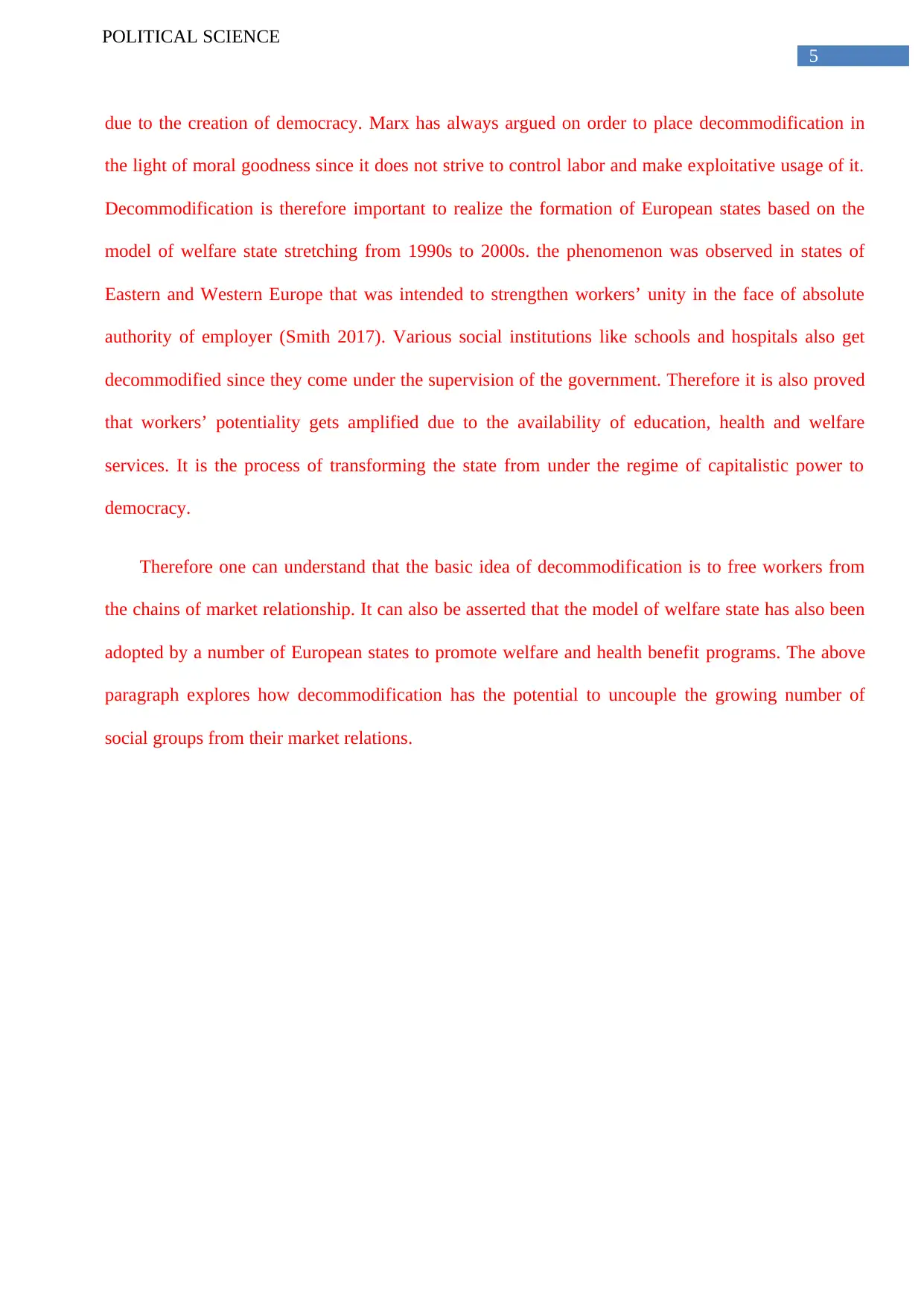
5
POLITICAL SCIENCE
due to the creation of democracy. Marx has always argued on order to place decommodification in
the light of moral goodness since it does not strive to control labor and make exploitative usage of it.
Decommodification is therefore important to realize the formation of European states based on the
model of welfare state stretching from 1990s to 2000s. the phenomenon was observed in states of
Eastern and Western Europe that was intended to strengthen workers’ unity in the face of absolute
authority of employer (Smith 2017). Various social institutions like schools and hospitals also get
decommodified since they come under the supervision of the government. Therefore it is also proved
that workers’ potentiality gets amplified due to the availability of education, health and welfare
services. It is the process of transforming the state from under the regime of capitalistic power to
democracy.
Therefore one can understand that the basic idea of decommodification is to free workers from
the chains of market relationship. It can also be asserted that the model of welfare state has also been
adopted by a number of European states to promote welfare and health benefit programs. The above
paragraph explores how decommodification has the potential to uncouple the growing number of
social groups from their market relations.
POLITICAL SCIENCE
due to the creation of democracy. Marx has always argued on order to place decommodification in
the light of moral goodness since it does not strive to control labor and make exploitative usage of it.
Decommodification is therefore important to realize the formation of European states based on the
model of welfare state stretching from 1990s to 2000s. the phenomenon was observed in states of
Eastern and Western Europe that was intended to strengthen workers’ unity in the face of absolute
authority of employer (Smith 2017). Various social institutions like schools and hospitals also get
decommodified since they come under the supervision of the government. Therefore it is also proved
that workers’ potentiality gets amplified due to the availability of education, health and welfare
services. It is the process of transforming the state from under the regime of capitalistic power to
democracy.
Therefore one can understand that the basic idea of decommodification is to free workers from
the chains of market relationship. It can also be asserted that the model of welfare state has also been
adopted by a number of European states to promote welfare and health benefit programs. The above
paragraph explores how decommodification has the potential to uncouple the growing number of
social groups from their market relations.
⊘ This is a preview!⊘
Do you want full access?
Subscribe today to unlock all pages.

Trusted by 1+ million students worldwide
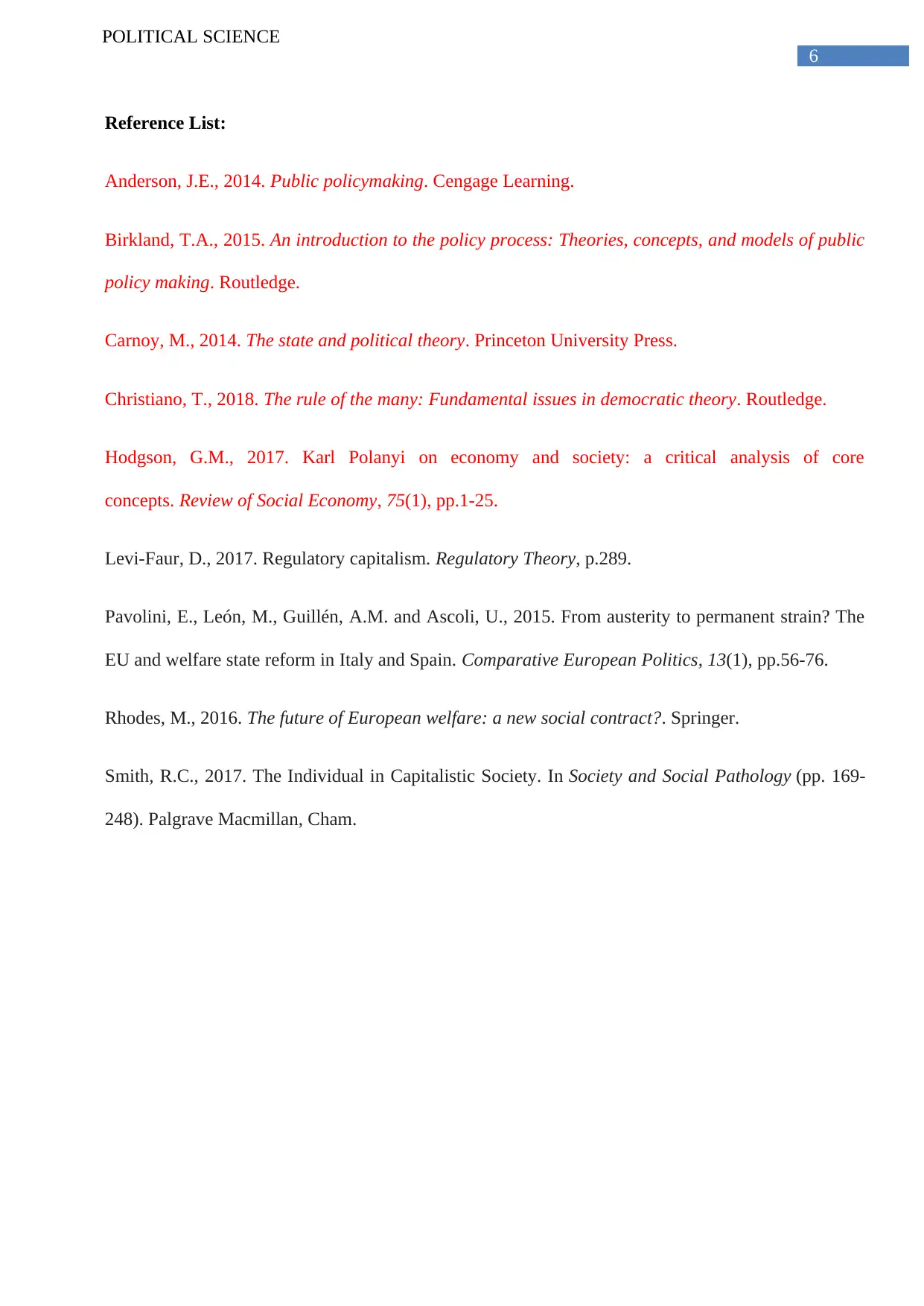
6
POLITICAL SCIENCE
Reference List:
Anderson, J.E., 2014. Public policymaking. Cengage Learning.
Birkland, T.A., 2015. An introduction to the policy process: Theories, concepts, and models of public
policy making. Routledge.
Carnoy, M., 2014. The state and political theory. Princeton University Press.
Christiano, T., 2018. The rule of the many: Fundamental issues in democratic theory. Routledge.
Hodgson, G.M., 2017. Karl Polanyi on economy and society: a critical analysis of core
concepts. Review of Social Economy, 75(1), pp.1-25.
Levi-Faur, D., 2017. Regulatory capitalism. Regulatory Theory, p.289.
Pavolini, E., León, M., Guillén, A.M. and Ascoli, U., 2015. From austerity to permanent strain? The
EU and welfare state reform in Italy and Spain. Comparative European Politics, 13(1), pp.56-76.
Rhodes, M., 2016. The future of European welfare: a new social contract?. Springer.
Smith, R.C., 2017. The Individual in Capitalistic Society. In Society and Social Pathology (pp. 169-
248). Palgrave Macmillan, Cham.
POLITICAL SCIENCE
Reference List:
Anderson, J.E., 2014. Public policymaking. Cengage Learning.
Birkland, T.A., 2015. An introduction to the policy process: Theories, concepts, and models of public
policy making. Routledge.
Carnoy, M., 2014. The state and political theory. Princeton University Press.
Christiano, T., 2018. The rule of the many: Fundamental issues in democratic theory. Routledge.
Hodgson, G.M., 2017. Karl Polanyi on economy and society: a critical analysis of core
concepts. Review of Social Economy, 75(1), pp.1-25.
Levi-Faur, D., 2017. Regulatory capitalism. Regulatory Theory, p.289.
Pavolini, E., León, M., Guillén, A.M. and Ascoli, U., 2015. From austerity to permanent strain? The
EU and welfare state reform in Italy and Spain. Comparative European Politics, 13(1), pp.56-76.
Rhodes, M., 2016. The future of European welfare: a new social contract?. Springer.
Smith, R.C., 2017. The Individual in Capitalistic Society. In Society and Social Pathology (pp. 169-
248). Palgrave Macmillan, Cham.
1 out of 7
Related Documents
Your All-in-One AI-Powered Toolkit for Academic Success.
+13062052269
info@desklib.com
Available 24*7 on WhatsApp / Email
![[object Object]](/_next/static/media/star-bottom.7253800d.svg)
Unlock your academic potential
Copyright © 2020–2026 A2Z Services. All Rights Reserved. Developed and managed by ZUCOL.





